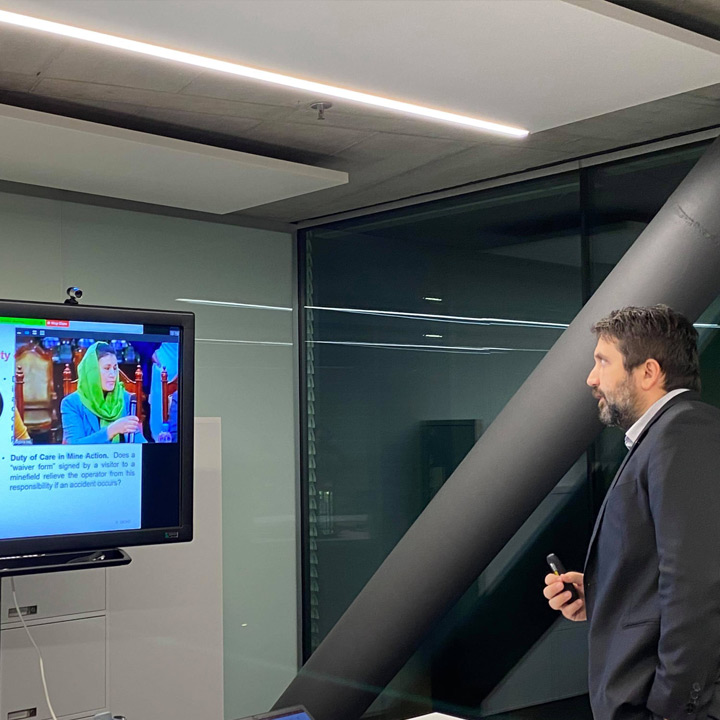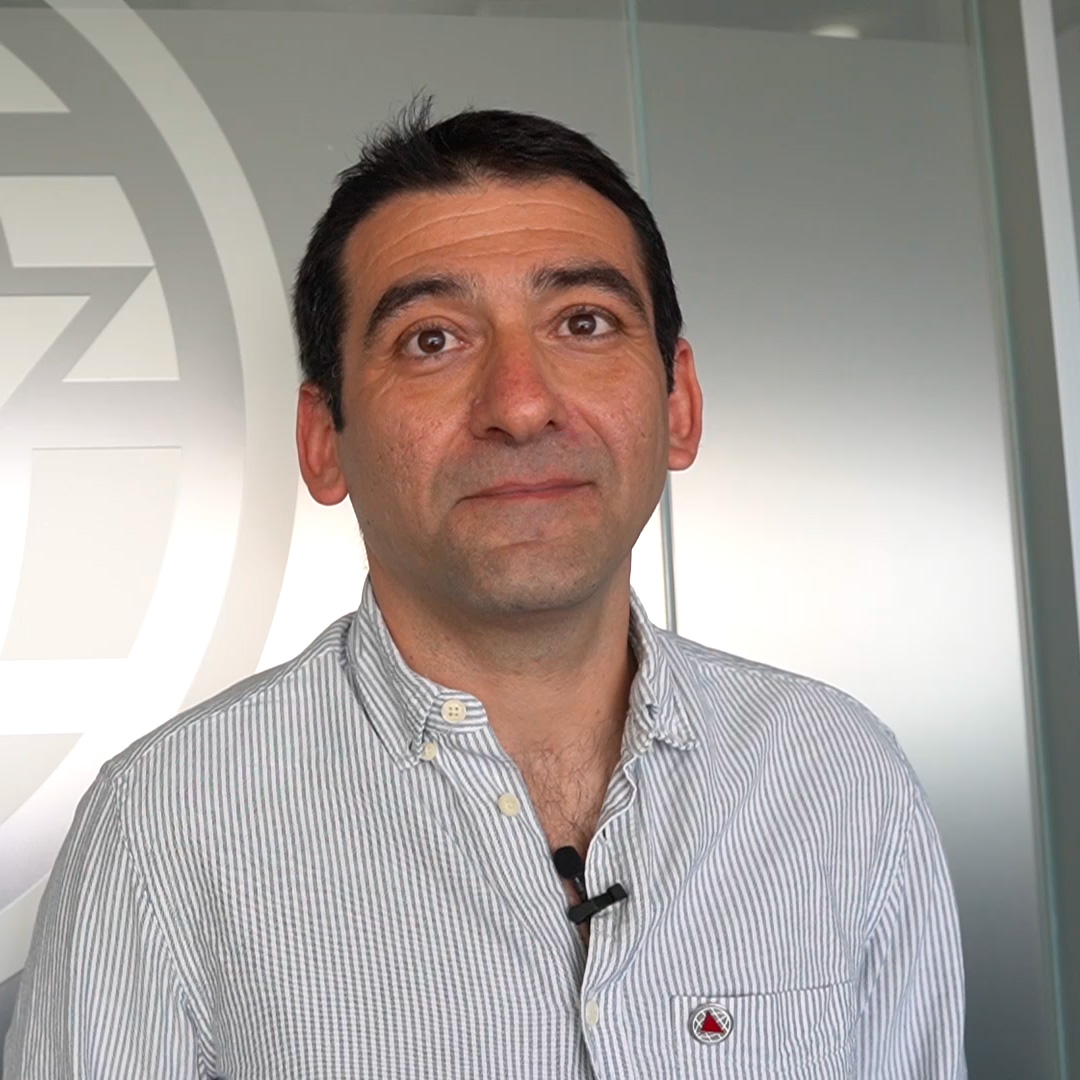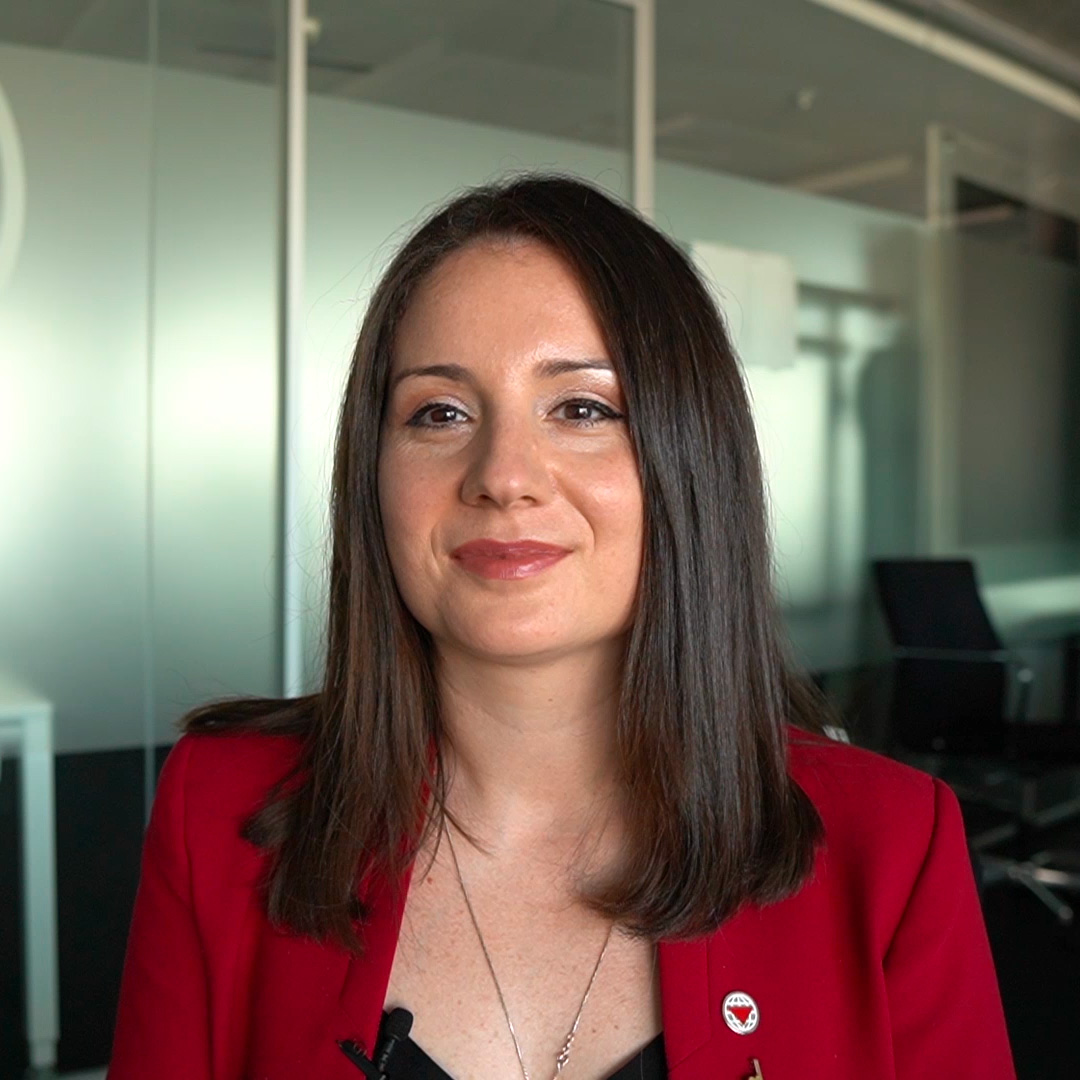Annual Report
2020
Reducing risk from explosive ordnance
Making communities safe


In 2020, the GICHD continued providing its services to national and international partners, with the ultimate goal of reducing risk from explosive ordnance and making communities safe. Faced with the challenges and limitations imposed by the COVID-19 pandemic, the Centre put much effort into adapting to the new context and ensuring the delivery of its services through remote means. This process paid off to a significant extent and proved the Centre’s flexibility and adaptability, whilst also generating lessons that are still being evaluated and that will influence its future way of operating.
Meanwhile, the GICHD reached the mid-term of its strategy 2019-2022, consolidating its traditional areas of work, but also developing new programmes. For example, the need for the GICHD to support affected states in developing strategic plans to address mine-action challenges has grown exponentially. Thus, in 2020, the GICHD decided to strengthen its strategic planning programme and reinforce the team. Also, the Centre worked towards enabling a more coherent approach to the delivery of projects at country level, ensuring in particular the correct timing and sequencing between the development and adoption of national standards and the operational follow-up, such as training.
In 2020, particular attention and efforts have been devoted to the roll-out of the GICHD Ammunition Management Advisory Team in response to requests for technical assistance to states in the safe and secure management of ammunition, to the integration of gender and diversity dimensions throughout all activities of the Centre and to the further study of linkages between mine action and sustainable development. Mine action is a precondition and a catalyst for achieving the Sustainable Development Goals, such as those related to poverty reduction, food security, education, health and gender equality. It is therefore essential for national authorities to integrate mine action into their broader national efforts related to humanitarian action, peace building and development.
Mine action is needed more than ever. At the GICHD, we are convinced that through the combination of political will, international solidarity and the implementation of good practices, a world in which societies can thrive free from explosive ordnance is possible and within reach.

Dr Barbara Haering
President of the Council of Foundation

Ambassador Stefano Toscano
GICHD Director
staff members
staff members
from
In its efforts to evolve its delivery methods, the GICHD considered the delivery of services online, via a hybrid method (partly online and partly in-person) and in-person (where possible).
Much of our work needed to migrate to remote delivery to enable us to maintain operational continuity. Building on the successful work done to develop and launch the online e-learning course on Gender, Diversity and Inclusion in 2019, the GICHD relied on similar tools and platforms to migrate other areas of its work. Over the course of 2020, some of our traditional training courses such as Technical Survey and Quality Management migrated fully or partially online. These courses were then delivered remotely to our partners. The feedback received was generally very positive.
With the evolution of our working modalities, it was important that the in-house capabilities and infrastructure evolved, too. Equally important was the recognition that both the quantity and the quality of our work had to go through a period of adjustment due to new delivery methods. On the whole the new methods have proven to work satisfactorily and have allowed the GICHD to deliver on most of its 2020 objectives. Still, not all of our work with external partners lent itself to be executed remotely. As a result, the GICHD staff travelled to several places in 2020, where this was safe and possible to do so.

In 2020, the GICHD supported national authorities, international and regional organisations, and NGOs in 49 countries and territories. The GICHD adapted to the COVID-19 crisis by increasing its remote support. However, when in-person contact was deemed essential and destinations were accessible, GICHD staff travelled to provide on-site support, liaise with partners and donors, and organise workshops and training courses.
National strategies are developed, adopted and implemented by states according to good practice
Read moreAfghanistan
German Federal Foreign Office, South Sudan
Angola
Kosovo, South Sudan, Sri Lanka, Zimbabwe
Afghanistan
National mine action standards (NMAS) are developed, adopted and implemented by states, according to international standards
Read moreCambodia, Vietnam, Yemen
Cambodia, Vietnam, Yemen
Yemen
Afghanistan, Yemen
IED Clearance Good Practice Guide
States and other partners use quality information to support their programming and operational management
Read moreBosnia and Herzegovina, Cambodia, Iraq, Lebanon
Afghanistan, Bosnia and Herzegovina, Cambodia, Iraq, Lebanon
Afghanistan, Libya, Solomon Islands, Tajikistan; Mayday Rescue for Syria, UNMAS in Cyprus, Democratic Republic of the Congo, Nigeria, Somalia
Technical Simulator (TSIM), Demining Accidents Database (DAD)
Operations Analyst (Colombia), Non-Technical Survey (Afghanistan), Accident Investigation (global), Quality Management (SEA-region), Operational Efficiency (Ukraine), Technical Survey (Afghanistan)
Regional cooperation furthers the exchange, dissemination and adoption of good practice
Read moreArmenia, Belarus, Benin, Burkina Faso, Central African Republic, Chad, Egypt, Iraq, Jordan, Lebanon, Libya, Mali, Mauritania, Morocco, Palestine, Russia, Somalia, Sudan, Tajikistan, Ukraine, Yemen
Armenia, Georgia, Somalia, Sudan, Tajikistan, Ukraine
14 IMAS (French), 14 IMAS and T&EP (Russian), 14 IMAS (Arabic)
Risks from explosive ordnance are reduced in a gender and diversity sensitive and responsive manner
Read moreAfghanistan, HALO Trust Afghanistan, HALO Trust Somalia
Afghanistan, Cambodia, Colombia, Iraq, Lebanon, Libya, Nigeria, Turkmenistan, Vietnam
Afghanistan, Cambodia, Colombia, Iraq, Lebanon, Libya, Nigeria, Tajikistan, Vietnam
Mauritania, Moldova
Guinea Bissau, UNODA, UN SaferGuard
UNODA-DPO’s DDR WAM course, OAS regional workshop on PSSM
Implementation of conventions is fostered through the provision of expertise and logistical support
Read moreby States Parties during the Anti-Personnel Mine Ban Convention (APMBC), the Convention on Cluster Munitions (CCM) and the Convention on Conventional Weapons meetings
Bosnia and Herzegovina, Chile, Colombia, Lebanon, South Sudan
Bosnia and Herzegovina, Democratic Republic of the Congo, Lebanon
by States Parties during the Anti-Personnel Mine Ban Convention (APMBC), the Convention on Cluster Munitions (CCM) and the Convention on Conventional Weapons meetings
The reduction of risks from explosive ordnance contributes to humanitarian action and sustainable development
Read moreUNDP, OSCE SMM, Mdp Gender and Diversity Hub, International Gender Champions, CEOBS, SIPRI, and GCSP
Bosnia and Herzegovina, Jordan, Lao PDR

Armen Harutyunyan is Operational Efficiency Advisor. Hear how his team provides advice and training services to national mine action authorities for an efficient and effective allocation of resources.
View storyTammy Hall is Head of Standards and Operations. Hear how her team puts a lot of effort into translating international guidance into national standards, adapting them to the country context.
View story

Steve Hellen is the GICHD’s new Head of Information Management. Find out how the powerful information management digital platform, IMSMA Core, and the definitions of data, help the mine action sector share information, compare data and outcomes, and aggregate results.
View storyJovana Carapic is Programme Manager for the Ammunition Management Advisory Team. She explains how her team provides technical assistance in safe and secure ammunition management to states, and develops methodologies, concepts and tools.
View story

Angela Hoyos is External Relations and Policy Advisor. She explains how mine action directly contributes to the Sustainable Development Goals, and presents the findings of her case study on Jordan.
View storyDominic Wolsey is Gender and Diversity Advisor. Hear how his team works towards gender equality and inclusion in mine action, and how it contributed to raising the profile of risk education in 2020.
View story
All amounts in CHF
The GICHD is grateful to all contributors who make its work possible. In 2020, the Centre benefitted from core contributions, project funding and in-kind support from 40 governments and organisations.



















ASEAN Regional Mine Action Centre, Austrian Ministry of Defence, Cambodian Mine Action Centre, City of Geneva, Descontamina - OACP, Directorate of Mine Action Coordination, Environmental Systems Research Institute (ESRI), Facebook, Fondation Suisse de Déminage, Government of Germany, Humanitarian Disarmament and Peacebuilding (HDP), Humanity & Inclusion (HI), International Committee of the Red Cross (ICRC), Janus, Lebanon Mine Action Center, Microsoft Azure, Mines Advisory Group (MAG), Norwegian People´s Aid (NPA), OSCE Project Co-ordinator in Ukraine, Safe Software Inc., Slido, Survey Monkey, Swiss Federal Department of Foreign Affairs, Swiss Federal Department for Defence, Civil Protection and Sport, Tetratech, The HALO Trust, United Nations Development Programme (UNDP) and Wix.